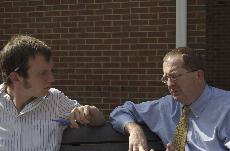From Oct. 4-6, the board of trustees congregated on campus for the first meeting of the 2007-2008 school year. Trustees and staff, but few faculty or students, sat through three days worth of meetings on subjects ranging from Quaker life on campus to the ethics of investing.
Four new trustees were inaugurated to the board, consisting of two non-alums and two graduates. The non-alums are Robert Jones, a professor at the Indiana School of Medicine, and Hector McEachern Jr., a Greensboro resident and executive vice president of Wachovia bank.
Daryle Bost ’93, majored in management while at Guilford and has been on the Alumni Association’s Board of Directors for two terms prior to his appointment to the Trustee Board.
David Hood, younger brother of Associate Professor of English Jim Hood, is a member of the Hood clan who has been affiliated with the college since 1837. He graduated in 1984, majored in accounting, and was president of the Alumni Board in 2002-2003.
“I’m very excited to have David on the Board of Trustees,” Jim Hood said. “I’m interested in being able to talk to someone about the college . but we have to be careful about communicating, because in one sense the board communicates through the president and not through the faculty.”
The addition of these four puts the number of trustees back to the typical size of 30 active members. Although it is required that half the board be Quaker, trustees do not need to have a connection to Guilford, although many are alumni and some are long-time Greensboro residents.
Policy is brought to the trustees at the three annual meetings and they can approve it – or not. For example, the gender-blind housing initiative was approved by the Community Senate and the administration but was shut down by the trustees last year. However, it is rare that the board interferes. As long as a president has their confidence, they will approve almost anything.
“They are the authority; they hire the president,” said Ty Buckner, senior director of communications and marketing. “They oversee the business of the college. They delegate authority to the president and other senior staff but a lot of the final decisions are left up to the authority of the trustees.”
The board delegates its work to twelve committees covering topics from academic affairs to enrollment and financial aid. Students are only able to sit in on a handful of committees.
“I felt that there was some pressure not to voice my opinion because I felt as though I wouldn’t be heard,” said Brennan Aberle, the treasurer of Community Senate, who sat in on the investment committee. “(The current head of the board of trustees) Joe Bryan (Jr.) described his doubts about socially responsible investing because he perceives it as hurting the college’s ability to grow the endowment. He said that we weren’t trying to please students or faculty. He seemed to be suggesting that Guilford is just a profit minded corporation.”
Bryan is a 30-year veteran of the board and a 1960 economics major graduate whose thesis is still on file at Hege Library. Bryan’s name should be familiar to those who have attended shows in Bryan Jr. Auditorium in the Frank Family Science Center or students who live in Bryan Hall, which is named after his parents.
Bryan is happy with the direction the college is going in. His chief worry, shared by many of the other trustees, is alcohol abuse on campus.
“There is a concern amongst some of us that the college is having a problem with substance abuse,” Bryan said. “We will discuss that at length in February. In my opinion it’s not that the young people start to abuse substances while they are here. It’s that they come here already with substance problems. When I went here alcohol wasn’t allowed on campus. You couldn’t even smoke on campus. Things have changed.”

